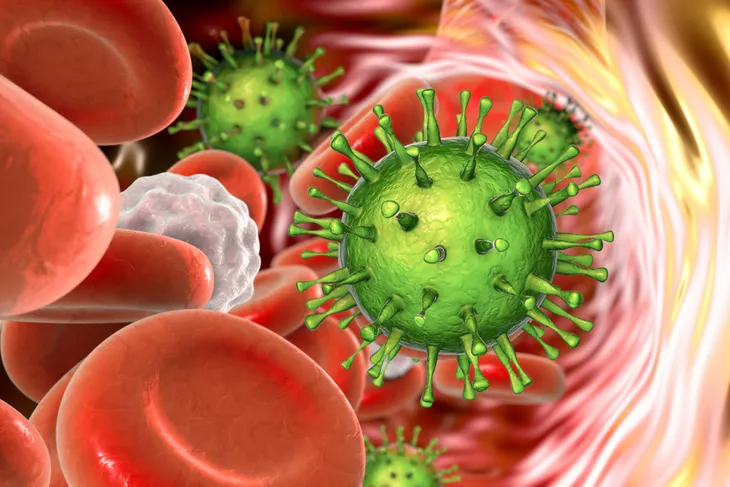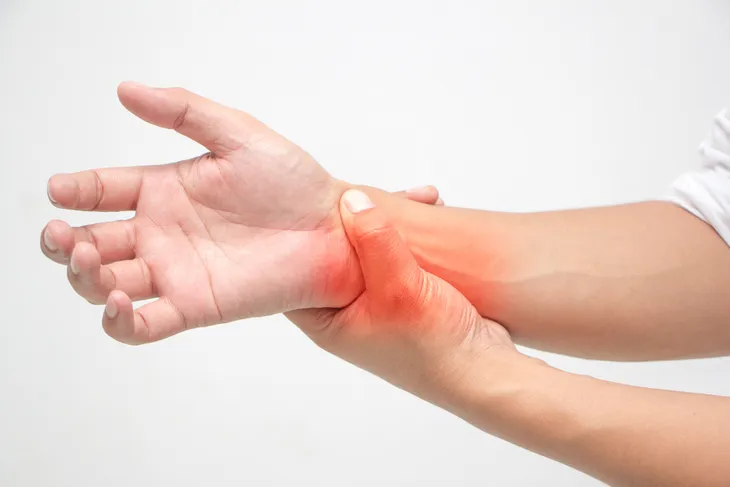Lupus is an autoimmune disease that causes the body’s immune system to fight itself. Symptoms can start suddenly or happen over time. Those with lupus have inflammation that affects their skin, joints, brain, kidneys, blood cells, and other parts of the body. It affects 20-150 per 100,000 people in the United States according to UpToDate.
One of the hallmark signs of lupus is a butterfly-shaped rash on the face. The rash covers both the cheeks and nose, however, you don’t have to have the rash to have lupus. The causes and triggers of lupus are different for each person. Some people have a strong family history, while others will be the first person in their family to be diagnosed. Check out our list of causes and triggers to help you identify if you are at risk or to learn what’s causing your lupus flare-ups.
Genetics
Researchers don’t know exactly what causes lupus. They believe it’s a combination of factors, one of which is genetics. According to the Lupus Foundation of America, “No single gene or group of genes has been proven to cause lupus. Lupus does, however, appear in certain families, and when one of two identical twins has lupus, there is an increased chance that the other twin will also develop the disease.”
If someone in your family has lupus talk to your doctor about the specific signs and symptoms that you should watch for. Avoid the triggers of lupus and take good care of your health. Genetics isn’t a modifiable risk factor, but you can do your best to stay healthy and avoid triggers.
Gender
Women are more likely than men to develop lupus. In fact, 9 out of 10 people who have lupus are women, reports WebMD. Why are women developing lupus at a much higher rate than men? Scientists believe that the hormone estrogen may play a role.
“Estrogen helps make women’s immune systems stronger than men’s, so the hormone could also trigger lupus or make it worse,” says WebMD. Women with lupus may experience worsening symptoms when they are pregnant or have their period. Although estrogen in and of itself does not cause lupus, it appears it is a piece of the puzzle.
Sunlight
People with lupus are prone to sensitivity to sunlight, known medical as photosensitivity. They can develop a rash when exposed to UV light. The characteristic rash seen is a “butterfly rash, which appears over the nose and cheeks, and discoid rashes that appear as disc-shaped, raised, scaly patches on any sun-exposed area of the body,” reports Everyday Health.
The UV light can also cause joint pain and soreness. Staying out of the sun or shielding yourself with high SPF sunscreen and protective clothing is crucial if you suffer from lupus. Also, keep an eye out for medications that increase photosensitivity, which may worsen your lupus.
Infections
When someone who doesn’t have lupus gets an infection, their body ramps up the immune system to fight off bacteria or viruses, and then the immune system relaxes when the infection is gone. But if you have lupus your immune system doesn’t relax as soon as the infection has cleared.
No one understands why the immune system in those with lupus continues to be elevated after an infection. There are at least three viruses that have been linked to lupus says WebMD, they are Epstein-Barr virus, cytomegalovirus, and the herpes zoster virus. Unfortunately, the best way to avoid a lupus flare is to avoid triggers, and avoiding trigger-related infections can be hard. Remember to stay away from people who are sick and wash your hands frequently, especially during the cold and flu season.
Medications
Some medications are linked to lupus and can cause a flare. Typically, when the person stops taking the medication, the lupus symptoms will also stop. There are approximately 50 different medications that have been linked to lupus. Some of them are antibiotics, diuretics, and heart rhythm medications, reports WebMD.
Not every medication in those drug classes causes lupus. If you are at risk for lupus or are having a lupus flare, review your medications with your doctor to identify any links. There are alternative options for most medications to help you avoid a trigger.
Toxins
Toxins in the environment have been linked to lupus. The most well-researched and well-known environmental toxin is silica. Silica is a mineral that can lead to exposure during mining and glassmaking states the Lupus Foundation of America. According to Frederick W. Miller, MD, PhD, “Silica is one of the strongest known risk factors for the development of lupus.”
Other toxins that have been linked to lupus are insecticides, pesticides, mercury, and cigarette smoke. Typically, these links are found in people who have work-related exposure, but there is enough evidence to support avoiding these toxins when possible to help reduce risk.
Stress
Life happens and stress isn’t always avoidable. If you have lupus, you probably are already well aware of how it can trigger a flare. Emotional stress caused by relationships, work, children, and just about everything else is a part of life. It’s how you manage those stressors that can make the difference.
Exercise, meditation, and yoga are all ways to get your body moving and primed to work through stress. If non-pharmacologic routes aren’t working for you, then you’ll want to talk to your doctor about medication that can help. Working with a therapist to identify stressful triggers and appropriate ways to manage them can also be helpful.
Food
No specific food causes lupus, but there are certain foods that some people with lupus have found make their symptoms worse. It may be helpful to avoid foods that increase inflammation, such as alfalfa sprouts, and foods in the nightshade category, says Everyday Health. If you have lupus, you may notice that red meat can trigger a flare. Each person is different, and whatever you find is triggering your flare should be avoided.
Even some health supplements can trigger lupus. Everyday Health tells us, “…melatonin, often used as a sleep aid, and echinacea, used to fight colds” can trigger a flare. Talk to your doctor before you start a new supplement to make sure you aren’t setting yourself up for a flare.
Age
Lupus can affect anyone, at any age. However, it is most often diagnosed between the ages of 15 and 45 says Mayo Clinic. Age is a non-modifiable risk factor. If you have other risk factors that put you at an increased risk for lupus then it’s time to work on improving your overall health and identifying modifiable risk factors.
Your age, genes, and gender can’t be changed. If you have multiple non-modifiable risk factors talk to your doctor about the things you can change to reduce your chances of developing lupus. Healthy changes your doctor might suggest could be exercising, eating healthy foods, avoiding environmental triggers, and minimizing stress.
Poor Sleep
Not sleeping well can make just about anyone cranky and less productive. But, if you have lupus, it can really affect your body. People with lupus can have worsening symptoms if they become overly fatigued from the lack of sleep. Their body will fight itself causing a flare.
Practice good sleep hygiene by developing a bedtime routine that works with your schedule. If you need to decompress before bed to help you sleep try meditation or yoga. Avoid watching TV in your bedroom to reduce stimuli and keep the room at a comfortable temperature.
Household Chemicals
The triggers for lupus can vary significantly from person to person. Some people will learn quickly what their triggers are, and it can take others time to determine what triggers their symptoms. Solvents found in paint thinners, nail polish, and glue may have a link to lupus. There are studies in animals that have found a connection but studies in humans aren’t quite as conclusive says the Lupus Foundation of America.
One household chemical that tends to get blamed for everything, hair dye, does not have a link to lupus, according to the Lupus Foundation of America. Many people with lupus become more aware of their body and notice changes. If you have introduced a new cleaning product or another chemical into your life, take note if you notice changes in how you’re feeling.
Environmental
With so many lupus triggers it can be difficult to determine exactly what’s causing your symptoms, especially when environmental factors are constantly changing. Something as simple as humidity can cause joint soreness, says the Lupus Foundation of America.
If you’re struggling to determine your triggers, start a journal to keep track of your symptoms, exposures, and diet. With a reference to look back on, you may see a pattern of triggers and lupus flares that you hadn’t seen before.
Injury
A physical injury can trigger a lupus flare. Injury causes the stress response within your body and stimulates the immune system. If you’ve had a serious injury not only will you need to recover from that but you might also have a lupus flare.
After an injury, it’s important to take care of yourself to recover. Talk to your family and friends to find support during your recovery phase. Have them help with household chores and errands, letting you get the rest you need to avoid a flare. Unfortunately, all injuries aren’t avoidable, but if you can let your body fully heal, you might avoid further pain.
















